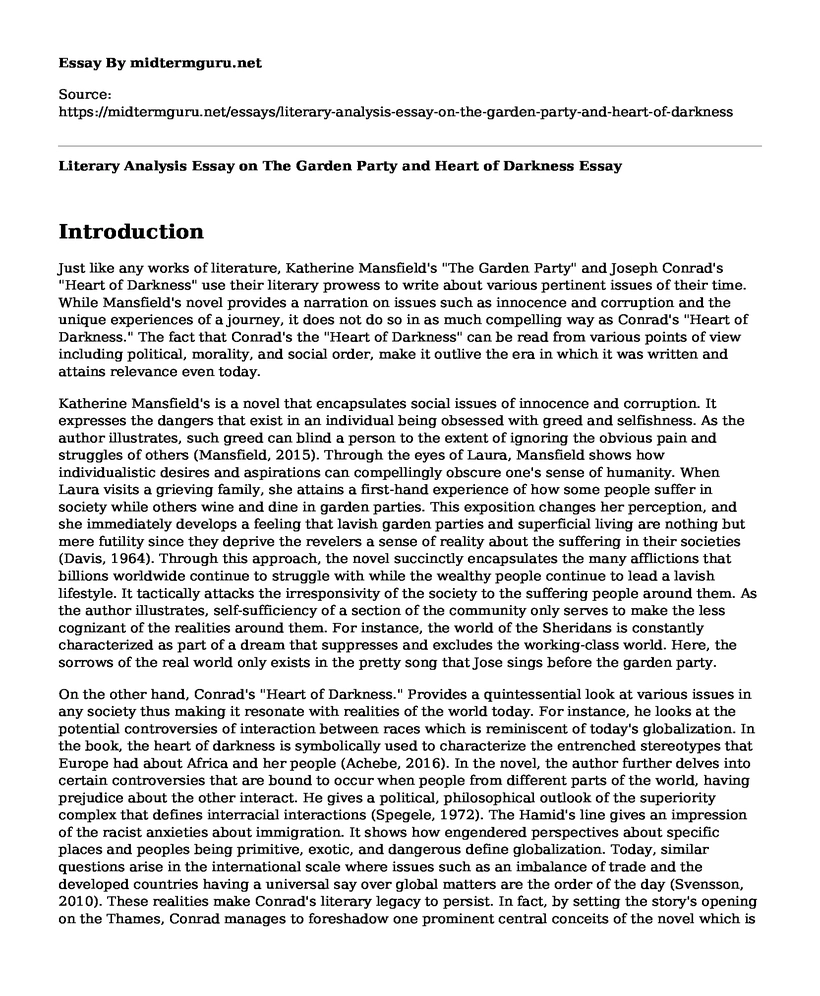Introduction
Just like any works of literature, Katherine Mansfield's "The Garden Party" and Joseph Conrad's "Heart of Darkness" use their literary prowess to write about various pertinent issues of their time. While Mansfield's novel provides a narration on issues such as innocence and corruption and the unique experiences of a journey, it does not do so in as much compelling way as Conrad's "Heart of Darkness." The fact that Conrad's the "Heart of Darkness" can be read from various points of view including political, morality, and social order, make it outlive the era in which it was written and attains relevance even today.
Katherine Mansfield's is a novel that encapsulates social issues of innocence and corruption. It expresses the dangers that exist in an individual being obsessed with greed and selfishness. As the author illustrates, such greed can blind a person to the extent of ignoring the obvious pain and struggles of others (Mansfield, 2015). Through the eyes of Laura, Mansfield shows how individualistic desires and aspirations can compellingly obscure one's sense of humanity. When Laura visits a grieving family, she attains a first-hand experience of how some people suffer in society while others wine and dine in garden parties. This exposition changes her perception, and she immediately develops a feeling that lavish garden parties and superficial living are nothing but mere futility since they deprive the revelers a sense of reality about the suffering in their societies (Davis, 1964). Through this approach, the novel succinctly encapsulates the many afflictions that billions worldwide continue to struggle with while the wealthy people continue to lead a lavish lifestyle. It tactically attacks the irresponsivity of the society to the suffering people around them. As the author illustrates, self-sufficiency of a section of the community only serves to make the less cognizant of the realities around them. For instance, the world of the Sheridans is constantly characterized as part of a dream that suppresses and excludes the working-class world. Here, the sorrows of the real world only exists in the pretty song that Jose sings before the garden party.
On the other hand, Conrad's "Heart of Darkness." Provides a quintessential look at various issues in any society thus making it resonate with realities of the world today. For instance, he looks at the potential controversies of interaction between races which is reminiscent of today's globalization. In the book, the heart of darkness is symbolically used to characterize the entrenched stereotypes that Europe had about Africa and her people (Achebe, 2016). In the novel, the author further delves into certain controversies that are bound to occur when people from different parts of the world, having prejudice about the other interact. He gives a political, philosophical outlook of the superiority complex that defines interracial interactions (Spegele, 1972). The Hamid's line gives an impression of the racist anxieties about immigration. It shows how engendered perspectives about specific places and peoples being primitive, exotic, and dangerous define globalization. Today, similar questions arise in the international scale where issues such as an imbalance of trade and the developed countries having a universal say over global matters are the order of the day (Svensson, 2010). These realities make Conrad's literary legacy to persist. In fact, by setting the story's opening on the Thames, Conrad manages to foreshadow one prominent central conceits of the novel which is that there is no absolute, essential difference between the perceived civilized societies and primitive ones.
The book also embodies the negative imperatives of ignorance and how accessing information helps to overcome particular misinformation as well as prejudices. Conrad shows that in the 19th century when the Africans and Europeans began interacting in earnest, ignorance about the two races created suspicions and disregard for each other's culture (Conrad, 2001). Today through constant interactions and eventual acculturation, people from different parts of the world understand and appreciate diverse cultures. It has helped to overcome certain prejudices. Now, the discourse has changed from which race is superior or which tradition is right to a sheer recognition that the differences between cultures are a strength.
References
Achebe, C. (2016). An Image of Africa: Racism in Conrad's Heart of Darkness. The Massachusetts Review, 57(1), 14-27.
Conrad, J. (2001). Heart of darkness. Mineola, N.Y: Dover Publications.
Davis, R. M. (1964). The Unity of" The Garden Party". Studies in Short Fiction, 2(1), 61.
Firchow, P. E. (2015). Envisioning Africa: Racism and Imperialism in Conrad's Heart of Darkness. University Press of Kentucky.
Mansfield, K. (2015). The garden party and other stories. Leicester: Ulverscroft.
Spegele, R. D. (1972). Fiction as Political Theory: Joseph Conrad's 'heart of Darkness'. British Journal of Political Science, 2(3), 319-337.
Svensson, M. (2010). Critical responses to Joseph Conrad's Heart of Darkness.
Cite this page
Literary Analysis Essay on The Garden Party and Heart of Darkness. (2023, Jan 10). Retrieved from https://midtermguru.com/essays/literary-analysis-essay-on-the-garden-party-and-heart-of-darkness
If you are the original author of this essay and no longer wish to have it published on the midtermguru.com website, please click below to request its removal:
- Essay on Responses to the Gettier Problem
- Identification and the Analysis of the Myth
- Essay Sample on Beowulf, an Archetypal Hero
- Literary Analysis Essay on Maya Angelou's Poems
- Character Analysis Essay on Macbeth
- Literature Analysis Essay on Hamlet and Othello
- Exploring the Contributions of Aboriginal Australian Writers - Research Paper







